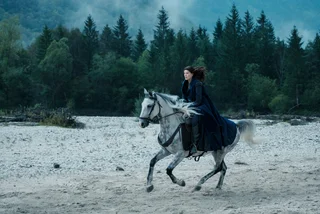The starting date of Febiofest, the largest film festival in Prague, has been pushed back. The festival will open on April 28 and run to May 4. It will also feature works by young Ukrainian filmmakers. Guests and the film program have not been announced, but the festival focuses on new Czech and international films, comedies, retrospectives of significant filmmakers, and films with LGBT+ themes.
The 29th edition of the festival had previously been scheduled to run April 19–28. The festival’s main venue will again be Cinema City Slovanský dům. Selected screenings and masterclass programs will take place in Kino Pilotu, Ponrepo, and Edison Filmhub. After the festival ends in Prague, some films will be screened in other cities.
Organizers decided to postpone Febiofest due to the current situation in western Europe. “We waited for the situation to develop further and thanks to our partners, we could eventually move the whole festival,” organizers told the Czech News Agency (ČTK).
The festival gives out several awards. Members of the public will be able to judge the comedy section. Anyone over the age of 15 can register their interest on the festival website until midnight on April 16. Festival founder Fero Fenič will select 33 entrants to participate. Czech actor and comedian Michal Suchánek will chair the jury. There will also be a jury of film professionals for the main competition.
The only film announced so far is the Italian film “The Truffle Hunters” as a cinema and culinary event to be held on May 3. After the screening at Slovanský dům, there will be a four-course meal at Obecní dům Restaurant by chef Marek Fichtner, who is behind the culinary concept of Prague’s Červený Jelen restaurant. The meal will of course feature truffles. Moderator Jolana Voldánová will comment on the meal’s courses in Czech.
While Febiofest is not a political event, it has already responded to the war in Ukraine. The festival rescinded a Kristián Award that it gave to Serbian director Emir Kusturica in 2017. The award is named after a famous Czechoslovak film and is equivalent to a lifetime achievement award.
Kusturica on Feb. 22 accepted the offer from Russian Defense Minister Sergei Shoigu to head the Central Academic Theater of the Russian Army in Moscow. Kusturica said he was looking forward to preserving classic values in a world where values change very quickly. The invasion of Ukraine started two days later. Kusturica in 2014 during the invasion of Crimea expressed support for Russian President Vladimir Putin.
“Some years ago I was against the prize being bestowed on him. For this reason, I did not attend the gala, for the first time in the festival's history. Nor did I meet Kusturica in person, even though we knew each other from our studies at FAMU and despite his wish to meet me,” Fenič said when the prize was revoked.
Fenič added that Kusturica's tendency to admire and support totalitarian leaders did not allow him to ignore the fact that despite Kusturica's talent, his work does not correspond to ethical, moral, and democratic values upon which the festival was founded after the Velvet Revolution and that the award embodies.
Febiofest in 2015 supported a campaign to release Ukrainian filmmaker Oleg Sentsov who was imprisoned in Russia due to his opposition to the annexation of Crimea. Sentsov has been sentenced to 20 years in prison but was released in 2019 as part of an exchange of prisoners between Ukraine and Russia.












 Reading time: 3 minutes
Reading time: 3 minutes 

























